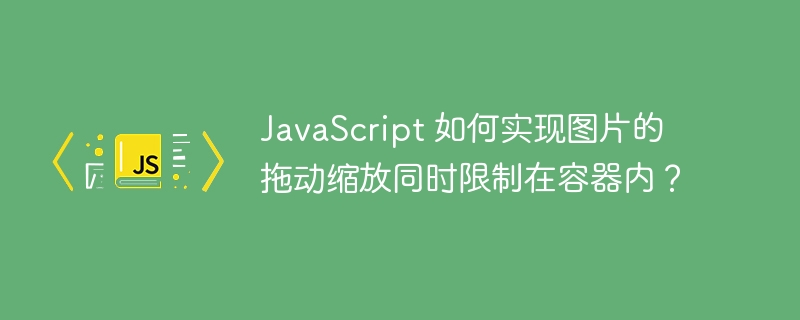

JavaScript How to realize dragging and zooming of images while limiting them to the container?
In web development, we often encounter the need to drag and zoom images. This article will introduce how to use JavaScript to implement dragging and zooming of images and limit operations within the container.
1. Drag the picture
To realize the dragging of the picture, we can use the mouse event to track the mouse position and move the position of the picture accordingly. The following is a sample code:
// 获取图片元素
var image = document.getElementById('image');
var isDragging = false; // 是否正在拖动
var startX = 0; // 开始拖动时的鼠标水平位置
var startY = 0; // 开始拖动时的鼠标垂直位置
var offsetX = 0; // 图片偏移量
var offsetY = 0; // 图片偏移量
// 鼠标按下时的事件处理函数
image.onmousedown = function(e) {
isDragging = true;
startX = e.clientX;
startY = e.clientY;
offsetX = image.offsetLeft;
offsetY = image.offsetTop;
};
// 鼠标移动时的事件处理函数
document.onmousemove = function(e) {
if (isDragging) {
var deltaX = e.clientX - startX;
var deltaY = e.clientY - startY;
image.style.left = offsetX + deltaX + 'px';
image.style.top = offsetY + deltaY + 'px';
}
};
// 鼠标松开时的事件处理函数
document.onmouseup = function() {
isDragging = false;
};In the above code, we use three event handling functions onmousedown, onmousemove and onmouseup to achieve the drag effect. In onmousedown, we record the position of the mouse and the initial offset of the image. In onmousemove, if you are dragging, calculate the displacement of the mouse and update the position of the picture. In onmouseup we set the dragging flag isDragging to false.
2. Zooming pictures
To achieve zooming of pictures, we can use the mouse wheel event to listen for mouse scrolling and change the size of the picture. The following is a sample code:
// 获取图片元素
var image = document.getElementById('image');
var scaleFactor = 1; // 缩放比例
// 鼠标滚轮事件处理函数
image.onmousewheel = function(e) {
e.preventDefault();
var delta = Math.max(-1, Math.min(1, (e.wheelDelta || -e.detail))); // 跨浏览器兼容性处理
// 计算缩放比例
if (delta > 0) {
scaleFactor *= 1.1;
} else {
scaleFactor *= 0.9;
}
// 设置图片的缩放
image.style.transform = 'scale(' + scaleFactor + ')';
};In the above code, we use the browser's wheel event to listen for mouse scrolling. We change the zoom ratio scaleFactor by judging the direction of the scroll wheel. Then, we use the transform attribute to set the zoom of the image.
3. Limit to the container
In order to limit the image to the container, we need to add some restrictions to the dragging and zooming code. The following is a sample code:
// 获取图片元素和容器元素
var image = document.getElementById('image');
var container = document.getElementById('container');
// 容器的宽度和高度
var containerWidth = container.offsetWidth;
var containerHeight = container.offsetHeight;
// 获取图片的原始宽度和高度
var imageWidth = image.offsetWidth;
var imageHeight = image.offsetHeight;
// 计算边界
var maxX = containerWidth - imageWidth;
var maxY = containerHeight - imageHeight;
// 拖动图片时的事件处理函数
// ...
// 缩放图片时的事件处理函数
// ...
In the above code, we first obtain the width and height of the container element, and the original width and height of the picture element. Next, we calculated the boundaries within which the image can move within the container. In the drag and zoom event handlers, we use these bounds to limit the position and size of the image.
To sum up, we can use the above code to realize the drag and zoom of the image and limit it to the container. This allows users to freely drag and zoom images within the container. Of course, we can also modify and optimize the code according to specific needs.
The above is the detailed content of How to use JavaScript to drag and zoom images while limiting them to the container?. For more information, please follow other related articles on the PHP Chinese website!




